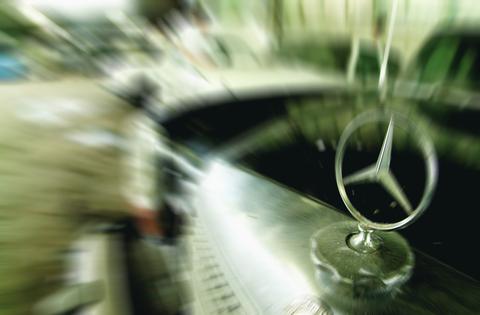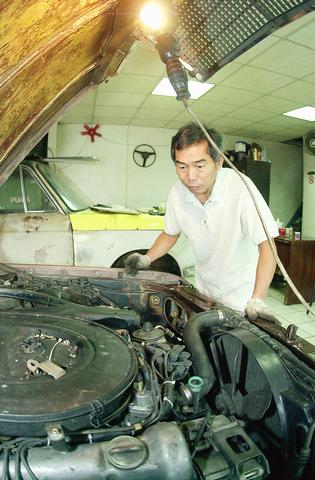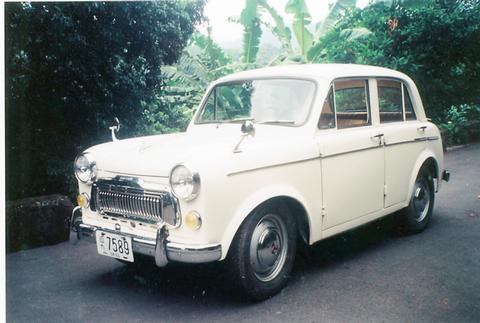With upwards of 5.3 million automobiles plying the nation's many highways and byways, for its geographical size, Taiwan is one of the world's most car-user-populated countries. And with entry into the WTO earlier this year, this already staggering figure is set to increase.
The once hefty import duty and tax imposed on foreign automobiles will be almost halved from its present 30 percent to 17.5 percent. And the increase in the annual quota of cars imported from Taiwan's largest hubs of automobile importation, Korea and Japan, is to rise from its' present rate of 7,700 units to 10,000 units annually.

According to recent reports, the change in import regulations will see the number of cars sold over the coming year skyrocket. It is predicted that the figure will increase by at least 100,000 units and reach an astounding 450,000 units.

PHOTO: GEORGE TSORNG, TAIPEI TIMES
In a country where the ownership of a top-range car is more often than not a matter of face, rather than of convenience, WTO entry has, needless to say left those looking to impress with the latest in four-wheel decadence salivating.
For car enthusiasts such as Chien Chun-ping (

PHOTO COURTESY OF CHIEN CHUN-PING
Since purchasing his first classic car, a late 1960s Toyota Corona Coupe Mk.II, 22 years ago for the then hefty price of NT$35,000, Chien has gone on to own over 60 of Taiwan's rarest classic cars at one time or another. Although the club has a membership of only 100, Taiwan's small number of collectors take their hobby very seriously.
Like international classic car clubs, the Chungchun hold regular rallies and its members and their cars have taken part in the official openings of both Taipei's Civil Boulevard (
The local advertising and music video industries also keep club members and the automobiles pretty busy. Many of the club's cars have appeared in MTV videos and TV commercials. Not that Chien allows local celebrities to drive his pride and joy. Whenever his cars are used he takes firm control of the wheel.
"I don't let anyone else drive the cars at all. Even if the producer wants to move the car a couple of feet I do it myself," Chien said. "If I dent the car so be it, but I certainly don't want anyone else doing that." While the Chungchun Car Association pales in significance when compared to the huge memberships which classic car clubs in Europe and the US attract, Taiwan's classic car collectors should not simply be dismissed.
When almost 30 years of import restrictions on vehicles and the difficulties in obtaining accessories are taken into consideration, Taiwan's classic car collectors should possibly be applauded for their efforts in keeping some of the nation's oldest and rarest automobiles on the road.
"The situation in Taiwan is very different from the US or Europe. There's not an ever increasing or changing pool of classic cars in Taiwan. The cars that are here have been for many years and they are few and far between," explained Lin Yi-deh (
According to Lin, there are somewhere between 1,000 and 2,000 road-worthy cars of 30 years or older in Taiwan. The most commonly owned of which are huge US gas-guzzlers such as Cadillacs and Chevrolets. European sports cars come a close second, with Asian-manufactured cars taking up the rear.
This small number of classic cars has meant that many such cars have been owned by more than one member of the club at one time or another since its founding eight years ago.
"As the numbers of both collectors and cars are so small many of the vehicles have been passed around from member to member over the years," stated Chien. "Of course, we do occasionally get new members with cars we've never seen before, but as a whole I reckon between us we have probably owned nearly all the classic cars in Taiwan at one time or another."
While Chien has spent a small fortune over the past quarter century on everything from a 1955 Mercedes Benz to an early 1960s-model Chevrolet and still dreams of owning a 1956 Maserati 1505, it is the simpler, less obtrusive classic car that attracts him nowadays.
"Sure, big flashy imports are great to drive and it's a buzz to be seen in one, but there is nothing there except image and huge gas bills," explained Chien. "So I decided to begin collecting locally produced, less popular family cars instead. After all, I am from Taiwan so why should I spend my time collecting something from a foreign country?"
Chien's love affair with Taiwan's box shaped family four-seaters began in the late 1970s. While nosing around a garage searching for spare parts, Chien discovered a rusty and dust-covered early model Yulon (
"I knew there was something special about the car even in its poor condition," recalled the car collector. "It was the fact that the slats on the radiator grill were vertical rather than horizontal which really caught my eye, however."
The 1,200cc Yulon did indeed turn out to be special. Originally intended for the garages of Generalissimo Chiang Kai-shek (
According to Chien, Chiang, already the proud owner of five customized Cadillacs, the only remaining one of which sits at Taipei's Chiang Kai-shek Memorial Hall -- the other four were turned into scrap metal over 15 years ago -- was not overly impressed by the nifty little Japanese runaround. Instead of using the car himself, Chiang gave to it the then head of Presidential Office No. 3 (
"I spent months pestering the garage owner for the owner's contact number. I finally found Wang in the US, where he'd retired to many years before, and asked him if he'd sell the car to me," continued Chien. "He finally agreed, on the condition that whenever he returned to Taiwan he could see the car."
Not that Chien has always been so lucky. During a sojourn to Kaohsiung County several years ago, Chien discovered a Pre-World War Two Japanese sedan rotting away in a garage. After locating the owner, who had been given the car by Japanese soldiers prior to their withdrawal from Taiwan, Chien made what he considered to be a generous offer for the car.
"I repeatedly asked about buying the wreck and later I learned that I wasn't the only person to have inquired about it. But the guy just doesn't want to part with it," stated Chien. "I guess the guy feels the car is worth more in sentimental value than anything else and doesn't really care if it never takes to the road again. Which is rather a shame as it is one of only one or two such cars in Taiwan.
Even if he had purchased the wreck, however, Chien would have had a very lengthy wait before the car was road-worthy. It took a total of six years for mechanics to restore the rust-covered 1,200 Yulon to its original form and other cars have been known to take even longer.
"It's boils down to a question of spare parts. Sure, if I was in Europe or the US I'd have no trouble getting parts from a garage or scrap dealer, but in Taiwan old, unwanted cars are scrapped very quickly," explained mechanic Liao Ching-long (
First taking an interest in such motors' after purchasing a 1956 Mercedes Benz 20 years ago, Liao has by sheer fluke found himself in the position of being one of a very small number of classic car restorers in Taiwan.
From a 1940s Nash brought to Taiwan by an officer in Chiang's army to a dilapidated Rolls Royce, Liao has tinkered with scores of makes of cars since the mid-1980s.
"It's not a position I went looking for, it just happened. I fixed my own Mercedes up and word spread about that and people began to bring their cars to me," recalled Liao, "It's a bit of a headache at times. People new to collecting old cars are often under the impression that fixing an old car is like fixing a new one."
According to Liao, a classic car can take anywhere from two months to a year to restore a car to its original state. "I've got a 1970s BMW in the garage at present. It's a real mess and needs both body and interior work done," he said. "Even though it's not an uncommon car, I reckon I'm looking at least a year of work."
When fully restored, driving around inconspicuously in a rare motor is of course all but impossible in Taiwan. While ensuring classic car theft is virtually unheard of, many owners of older cars often find themselves the target of traffic cops' curiosity.
According to Lin, however, local classic car hobbyists have little to worry about if pulled over by the police for minor traffic violations.
"Ok, if you get caught driving an unregistered car it can be confiscated," said Lin. "But the flashier or rarer the car, the more chance you have of getting away with most minor infractions. In my experience, the cops are more interested in talking about the car than arresting you.

June 23 to June 29 After capturing the walled city of Hsinchu on June 22, 1895, the Japanese hoped to quickly push south and seize control of Taiwan’s entire west coast — but their advance was stalled for more than a month. Not only did local Hakka fighters continue to cause them headaches, resistance forces even attempted to retake the city three times. “We had planned to occupy Anping (Tainan) and Takao (Kaohsiung) as soon as possible, but ever since we took Hsinchu, nearby bandits proclaiming to be ‘righteous people’ (義民) have been destroying train tracks and electrical cables, and gathering in villages

Dr. Y. Tony Yang, Associate Dean of Health Policy and Population Science at George Washington University, argued last week in a piece for the Taipei Times about former president Ma Ying-jeou (馬英九) leading a student delegation to the People’s Republic of China (PRC) that, “The real question is not whether Ma’s visit helps or hurts Taiwan — it is why Taiwan lacks a sophisticated, multi-track approach to one of the most complex geopolitical relationships in the world” (“Ma’s Visit, DPP’s Blind Spot,” June 18, page 8). Yang contends that the Democratic Progressive Party (DPP) has a blind spot: “By treating any

Swooping low over the banks of a Nile River tributary, an aid flight run by retired American military officers released a stream of food-stuffed sacks over a town emptied by fighting in South Sudan, a country wracked by conflict. Last week’s air drop was the latest in a controversial development — private contracting firms led by former US intelligence officers and military veterans delivering aid to some of the world’s deadliest conflict zones, in operations organized with governments that are combatants in the conflicts. The moves are roiling the global aid community, which warns of a more militarized, politicized and profit-seeking trend

This year will go down in the history books. Taiwan faces enormous turmoil and uncertainty in the coming months. Which political parties are in a good position to handle big changes? All of the main parties are beset with challenges. Taking stock, this column examined the Taiwan People’s Party (TPP) (“Huang Kuo-chang’s choking the life out of the TPP,” May 28, page 12), the Democratic Progressive Party (DPP) (“Challenges amid choppy waters for the DPP,” June 14, page 12) and the Chinese Nationalist Party (KMT) (“KMT struggles to seize opportunities as ‘interesting times’ loom,” June 20, page 11). Times like these can